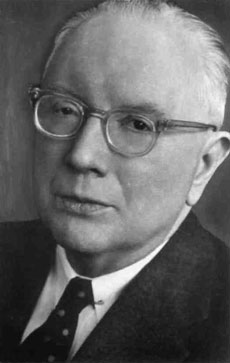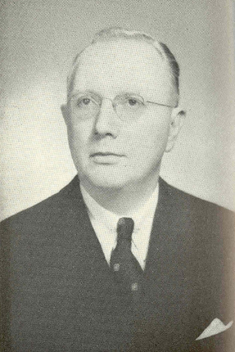<Back to Index>
- Jurist Myres S. McDougal, 1906
PAGE SPONSOR


Myres S. McDougal was a professor at the Yale Law School for fifty years. Born in Burton Mississippi on November 23, 1906, he died on May 7, 1998.
He received undergraduate and LL.B. degrees from the University of Mississippi, was a Rhodes Scholar at Oxford University, from which he received a B.C.L. in 1930, and received a J.S.D. from Yale in 1931. He began teaching property law at Yale in 1934. During World War II he served as assistant general counsel of the US Lend - Lease Administration in 1942 and general counsel of the US State Department’s Office of Foreign Relief and Rehabilitation Operations. After the war he returned to the Yale Law School and achieved recognized distinction in the field of international law. Professor McDougal served on the US delegation to the 1969 UN conference in Vienna that produced the Convention on the Law of Treaties. Second Circuit Judge José A. Cabranes said of him, "Myres McDougal was, without a doubt, the greatest international lawyer of his time."
Professor McDougal's books included:
- The law school of the future: From legal realism to policy science in the world community (1947)
- Property, wealth, land: Allocation, planning and development; selected cases and other materials on the law of real property, an introduction (1948)
- The Public Order of the Oceans: A Contemporary International Law of the Sea (1962) (with William T. Burke)
- Law and Public Order in Space (1963) (with Harold D. Lasswell)
- Human Rights and World Public Order: The Basic Policies of an International Law of Human Dignity (1980) (with Harold D. Lasswell and Lung-chu Chen)
- The International Law of War: Transnational Coercion and World Public Order (1994) (with Florentino P. Felciano)
His students included: Byron R. White, Bill Clinton, Nicholas Katzenbach and José A. Cabranes.
As a property scholar, Professor McDougal was famous for asking the question, later asked and answered in United States v. Willow River Power Co., whether the courts protect an asserted interest because it is a property right or is it a property right because the courts protect it. Professor McDougal was also famous for popularizing in legal analysis the concept of hierarchy of values, and the fact that different jurists' or analysts' resolution of particular legal controversies could be explained as the result of their having different hierarchies of values.
Professor McDougal was president of the American Society of International Law and was president of the Association of American Law Schools.